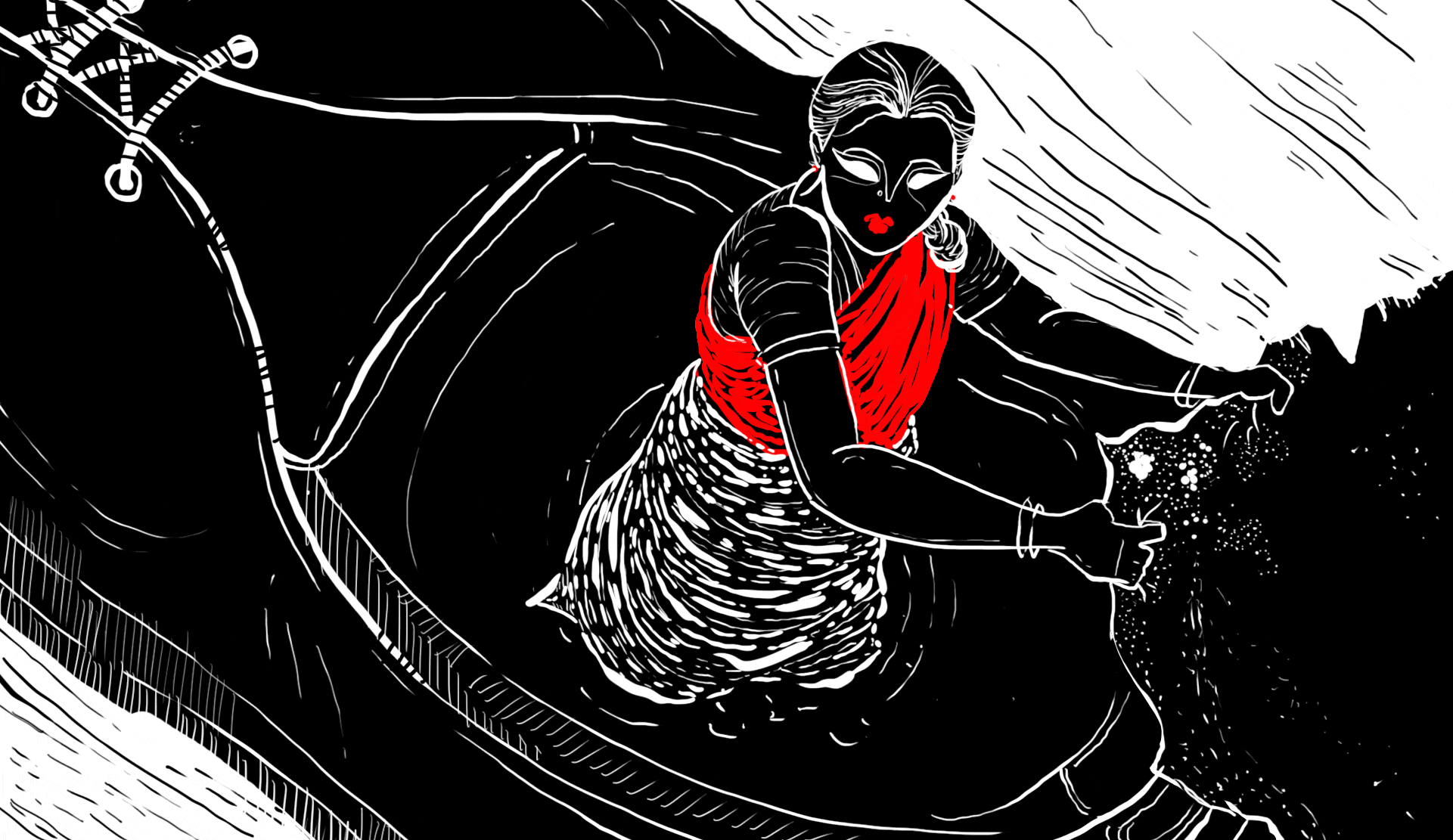Editor’s Note: Naked display of dissent straddles the boundary that separates fear from revolution. For India’s Dalits, this proclamation of dissent has assumed many forms, both passive and combative. It has mutated over the millennia before BR Ambedkar prodded the word Dalit into mainstream consciousness, and transformed anew since then. Some things have not changed — songs remain the sinew of Dalit protest in almost all its configurations. And the lyrics that sew these together continue to serve as a manifesto of resistance. The poems in this series, drawn from Tamil, Telugu, Kannada, Bengali, Gujarati, Marathi and curated by Krupa Ge, founding editor of The Madras Mag, represent the prosody of contemporary Dalit literature. They are accompanied by Chennai artist Satwik Gade’s illustrations. In the 11th edition of the column, meet Urdu poet Jayant Parmar from Ahmedabad. His poetry collections include ‘Aur’ (1999), ‘Pencil aur Doosri Nazmen’ (2006), ‘Manind’ (2007), ‘Antaral’ (2010) and ‘Gaconetti ke sapne’ (2016). He was awarded the central Sahitya Akademi award for Urdu 2009 for ‘Pencil aur Doosri Nazmen’ and Bhasha Bharti Samman in 2006 for ‘Aur’. His work has been translated in Kashmiri, Punjabi, Hindi, Marathi, Bangla, Kannada, Gujarati, Oriya and Slovenian.
 [/imgcenter] The stink of hell-pit The smell of hell-pit used to dog me right up to my school. Under the canopy of a scorching sun she would descend barefoot in the hell-pit. She would soak stinking animal hide in salt and water and cleanse it with her numb feet In return, she would bring for me a few pieces of meat. Even today when I polish my shoes with cherry blossom before leaving for office in their glow I see my mother’s face. The smell of hell-pit dogs me right into my office! From ‘Pencil aur doosri nazmein’ Dr GK Vankar has translated this poem from the original. He is a Professor of Psychiatry. He has translated Gujarati Dalit literary works in English as well as Hindi. He has also translated Jayant Parmar’s Urdu poetry, ‘Inkpot and other poems’, and BN Vankar’s Gujarati Dalit poetry, ‘Overbridge’. His translations have appeared in literary journals such as ‘Indian Literature’ and ‘Muse India’, and ‘Shared Mirror’. He has created several blogs on selections and translations of Dalit poetry from Gujarati and Marathi languages. He was the editor of biomedical professional journal, ‘Archives of Indian Psychiatry’ of Indian Psychiatric Society.
[/imgcenter] The stink of hell-pit The smell of hell-pit used to dog me right up to my school. Under the canopy of a scorching sun she would descend barefoot in the hell-pit. She would soak stinking animal hide in salt and water and cleanse it with her numb feet In return, she would bring for me a few pieces of meat. Even today when I polish my shoes with cherry blossom before leaving for office in their glow I see my mother’s face. The smell of hell-pit dogs me right into my office! From ‘Pencil aur doosri nazmein’ Dr GK Vankar has translated this poem from the original. He is a Professor of Psychiatry. He has translated Gujarati Dalit literary works in English as well as Hindi. He has also translated Jayant Parmar’s Urdu poetry, ‘Inkpot and other poems’, and BN Vankar’s Gujarati Dalit poetry, ‘Overbridge’. His translations have appeared in literary journals such as ‘Indian Literature’ and ‘Muse India’, and ‘Shared Mirror’. He has created several blogs on selections and translations of Dalit poetry from Gujarati and Marathi languages. He was the editor of biomedical professional journal, ‘Archives of Indian Psychiatry’ of Indian Psychiatric Society.
The hell-pit that is caste
Jayant Parmar
• August 6, 2017, 13:00:30 IST
In this 11th edition of Bards of Resistance, meet Urdu poet Jayant Parmar from Ahmedabad
Advertisement
)
At an age when they should be flying kites, the children of my community begin earning their daily bread. I too have suffered the acid burns of a caste system that is thousands of years old. The pain of the anti-reservation movement in Gujarat as well as elsewhere, has accumulated within me and reveals itself as poetry. They are not mere descriptions of events or analysis or just passing things. They are a search for roots, too. I cannot write anything that has emerged only from the world of dreams and is far from the truth of life. All epics that deny the existence of human beings should be thrown away in ocean. True poetry is that which inspires and heartens human beings in their struggles through life. Though Gujarati is my mother-tongue, I taught myself the Urdu script and language as my neighbourhood was predominantly Muslim. Painting was a hobby since my childhood days. In Urdu titles on movie screens and in the aayats inscribed on mosque walls, I saw paintings. This is why (after learning Urdu) I am fond of calligraphy. [imgcenter]
[/imgcenter] नरककुंडकी बास नरककुंडकी बास मेरे स्कूल तक आती थी धूपकी छतरीके नीचे नंगे पाँव उतरती थी नरककुंडमें ! . जानवरोंके चमड़ेको नमक और पानीमें भिगोकर अपने मरियल पाँवोंसे कर देती ठी साफ़. बदलेमें वह गोष्तके टुकड़े ले आती थी मेरे लिये!! आज भी मैं आफिस जानेसे पहले अपने जूतेको चेरी पालिश करता हूँ तब उसकी चमकमें माँका चेहरा दिखता है. नरककुंडकी बास मेरे आफिस तक आती है ! [imgcenter]
End of Article